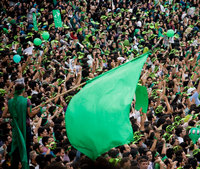As we watch the dramatic events unfold in Iran, it is useful to reassess the merits of Iranian elections. Critics of the Islamic regime often dismiss presidential, parliamentarian (Majlis) and municipal elections as a manipulative sham used by a malevolent regime to flaunt its supposed legitimacy to the outside world. They may point to the current crisis as proof of their claim.
Obviously, elections alone in the Islamic Republic of Iran do not make the country an ideal and transparent democracy. They do, however, provide for two unintended, yet noteworthy, outcomes that are rarely reflected upon in the West.
First, in recent years, these elections have managed to offer a brief and rare opportunity for civic engagement by a population that is otherwise frustratingly shut out of the political decision-making process. Starting with the presidential elections of 1997, which surprisingly swept the unlikely candidate Mohammad Khatami into the presidency, to the recent Facebook and Twitter campaign of Mir Hussein Moussavi, Iranians have often demonstrated their ability for civic engagement via grassroots mobilization of diverse interest groups -- perhaps more so than among any other Middle Eastern people.

